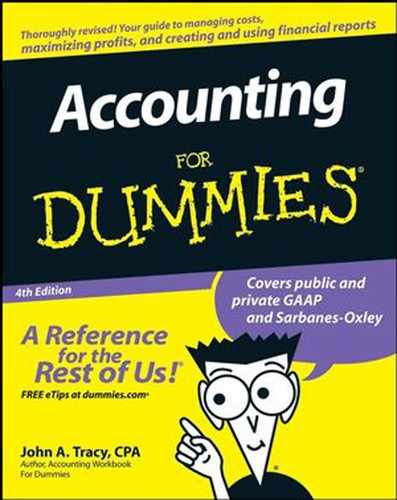12.6. Going Public or Keeping Things Private
Suppose you had the inclination (and the time!) to compare 100 annual financial reports of publicly owned corporations with 100 annual reports of privately owned businesses. You'd see many differences. Public companies are generally much larger (in terms of annual sales and total assets) than private companies, as you would expect. Furthermore, public companies generally are more complex — concerning employee compensation, financing instruments, multinational operations, federal laws that impact big business, legal exposure, and so on.
NOTE
Private and public businesses are bound by the same accounting rules for measuring profit and for valuing assets, liabilities, and owners' equity, and for disclosures in their financial reports. (To be more precise, private companies are exempt from a couple of accounting rules.) But most of the accounting and financial reporting standards that have been issued over the last two or three decades are directed mainly to public companies; by and large private companies do not have these accounting issues. As I mention in Chapter 2, the accounting profession has taken initiatives with the goal of better recognizing the different needs of private companies and the constituents of financial reporting by private companies. Well, this is the party line. In my view, the main purpose is to lighten the accounting and financial reporting burden on private companies, which generally don't have the time or the accounting expertise to comply with the large number of complex standards on the books.
12.6.1. Reports from publicly owned companies
Around 10,000 corporations are publicly owned, and their stock shares are traded on the New York Stock Exchange, NASDAQ, or other stock markets. Publicly owned companies must file annual financial reports with the SEC — the federal agency that makes and enforces the rules for trading in securities (stocks and bonds). These filings are available to the public on the SEC's EDGAR database (see the sidebar "Financial reporting on the Internet").
The annual financial reports of publicly owned corporations include all or most of the disclosure items I list earlier in the chapter (see the section "Making Sure Disclosure Is Adequate"). As a result, annual reports published by large publicly owned corporations run 30, 40, or 50 pages (or more). The large majority of public companies put their annual reports on their Web sites. Many public companies also present condensed versions of their financial reports — see the section "Recognizing condensed versions" later in this chapter.
Annual reports from public companies generally are very well done — the quality of the editorial work and graphics is excellent; the color scheme, layout, and design have very good eye appeal. But be warned that the volume of detail in their financial reports is overwhelming. (See the next section for advice on dealing with the information overload in annual financial reports.)
While private companies are cut some slack when it comes to reporting certain financial information — such as earnings per share — the requirements for publicly owned businesses are more stringent. Publicly owned businesses live in a fish bowl. When a company goes public with an IPO (initial public offering of stock shares), it gives up a lot of the privacy that a closely held business enjoys. A public company is required to have its annual financial report audited by an outside, independent CPA firm. In doing an audit, the CPA passes judgment on the company's accounting methods and adequacy of disclosure.
12.6.2. Reports from private businesses
Compared with their public brothers and sisters, private businesses generally provide few additional disclosures in their annual financial reports. Their primary financial statements with the accompanying footnotes are pretty much it. Often, their financial reports may be printed on plain paper and stapled together. A privately held company may have very few stockholders, and typically one or more of the stockholders are active managers of the business, who already know a great deal about the business. I suppose that a private company could e-mail its annual financial report to its lenders and shareowners, although I haven't seen this yet.
NOTE
Private corporations could provide all the disclosures I mention in this chapter — there's certainly no law against doing so. But they generally don't. Investors in private businesses can request confidential reports from managers at the annual stockholders' meetings (which is not practical for a stockholder in a large public corporation). And major lenders to a private business can demand that certain items of information be disclosed to them as a condition of the loan.
A private business may have its financial statements audited by a CPA firm but generally is not required by law to do so. Frankly, CPA auditors cut private businesses a lot of slack regarding disclosure. I don't entirely disagree with enforcing a lower standard of disclosure for private companies. The stock share market prices of public corporations are extremely important, and full disclosure of information should be made publicly available so that market prices are fairly determined. On the other hand, the ownership shares of privately owned businesses are not traded, so there's no urgent need for a complete package of information.
